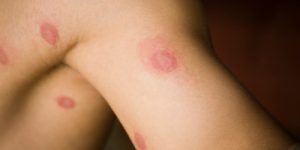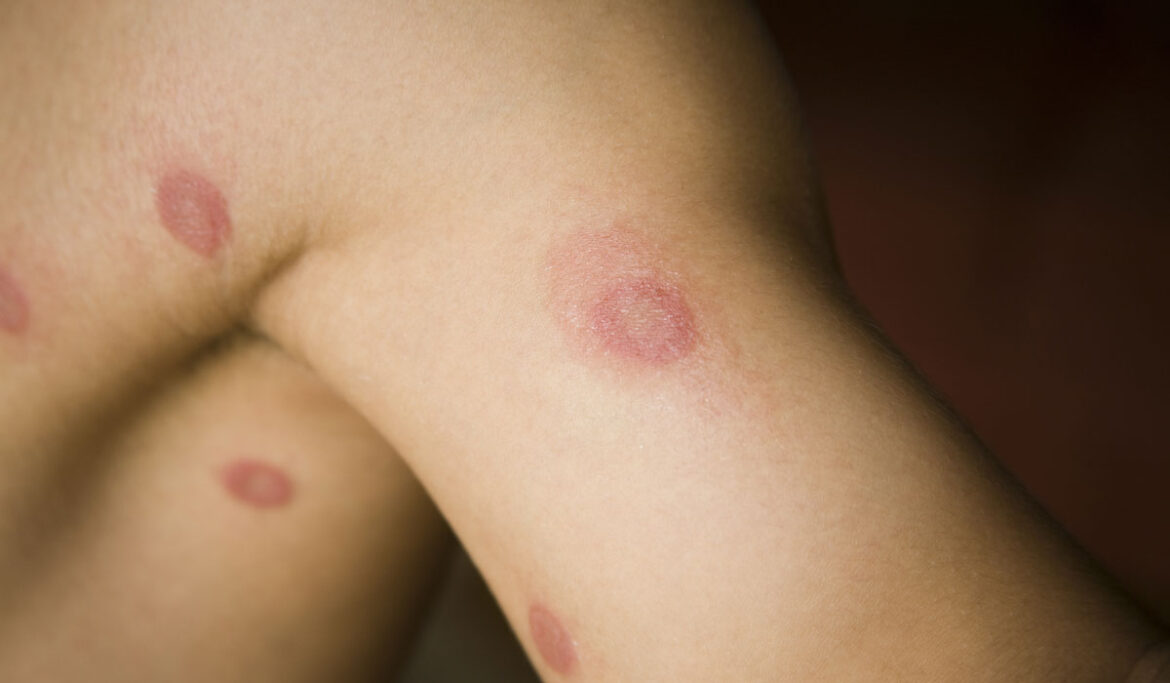What does the term ‘Ringworm’ mean?

Also known as Tinea, ringworm means a common fungal skin infection. This condition can generally has an effect on the skin on one’s body (tinea corporis), the groin (jock itch / tinea crucris), the feet (athlete’s foot / tinea pedis) or the scalp (tinea capitis).
Does suffering from ringworm means one has worms?

No, worms are not the cause of ringworm as it is simply a fungal infection that most of the times appears in a ring-shaped rash. This rash can be in normal skin color or can have a red center. The other forms in which a rash can appear can be nummular eczema, spider bites or Lyme disease that is a condition of severe infection, which leads to a rash that looks like a bull’s eye. All these conditions require different and proper line of treatment.
What are the reasons of ringworm?

There are a number of fungi that helps the human body but the dermatophyte type can lead to irritation and can cause ringworm. These kinds of fungi survive on dead tissues found on our nails, hair and skin. Dermatophyte is that kind of a fungus that is produced in humid and warm areas such as the areas where the skin folds between the toes and of the groin area. A person who has small injuries on nails, skin or scalp, or sweat overly are at higher risk of suffering from ringworm.
Tinea Corporis (Ringworm of the Body)

Ringworm of various kinds can affect different body parts and when it affects the skin, it leads to scabby, itchy, elevated and red patches that might burn and discharge. Generally these patches have sharp clear ends. These patches sometimes look like a ring with the normal skin color in the center and redder area outside. The skin can look oddly light or dark than the normal color of the skin.
Tinea Capitis (Ringworm of the Scalp)

Ringworm affecting the scalp is generally seen children during adolescence or in late childhood. This condition often spreads in schools. Scaly and patchy bald spots appear on the scalp of the person.
Tinea Pedis (Ringworm of the Foot)

Also called athlete’s foot, this fungal infection is a very common skin disorder. Tinea Pedis causes inflammatory and scaly areas in the toe webs, mainly between the 4th and 5th toes. Redness, itching, stinging and burning sensation on the feet’s soles are the other indication.
Tinea Cruris (Ringworm of the Groin)

Also known as Jock itch or the tinea of the groin, this condition leads to reddish-brown spots that may spread right from the groin’s fold up to one or both the thighs. Adolescent boys as well as adult men mainly suffer from this condition. The main reason is humid and hot environment because of excess sweating or rubbing caused from tight clothes.
Tinea Barbae (Ringworm of the Beard)

In Tinea Barbae, marked and swelled crusting appear on the beck and the face that can also lead to hair breakage.
Tinea Faciei (Ringworm of the Face)

Tinea Faciei is a condition that appears on the face area outside of the bearded area. These patches on the face are sometimes in the shape of a ring. Typically, there are scaly and red patches that have unclear ends.
Tinea Manus (Ringworm of the Hand)

Ringworm of the hands mainly appears in the areas between the fingers and the surface of the palm. Generally appearing in only one hand, this problem leads to hyperkeratosis or thickening of the affected areas. Also known as tinea manuum, it typically appears along with ringworm of the feet / tinea pedis.
Tinea Unguium (Ringworm of the Nails)

A common fungal infection of the nails, it is also known as onychomycosis. While the fingernails appear thick, brittle, opaque and white, the toenails appear brittle, thick and yellow. People with artificial nails are at higher risk as nail filers / emery boards may be carrying infectious germs. Sometime water gets collected underneath the artificial nails, leading to moist space where fungi can easily thrive.
Does these condition spread through contact?

Ringworm can spread in a number of ways as it is extremely infectious:
- One can catch it from an infected human being, an object, an animal and even from soil.
- The affective fungi also prospers in the folds of the skin like the groin and between the toes of the foot.
- Moistness and warmth also leads to growth of fungi, mainly in the areas where one sweats often.
Communicating ringworm from the pets

Zoonotic disease are those which transmit from animals to humans and ringworm is one those diseases. Cat is one of the most normally affected animals. If a person’s cat is suffering from ringworm, then there are higher chances that person also gets infected. The other such animals are pigs, dogs, horses, goats and cows. This condition is caused by touching the infected animal or touching their grooming items, carpets, beds and saddles.
How can ringworm be diagnosed?

There are cases where ringworm can easily be diagnosed from its appearance and position. In other cases, the doctors test skin scrapings.
How can ringworm be treated?

The problem of ringworm can be easily treated by applying anti-fungal medicated creams that contain ketoconazole (Nizoral), clotrimazole (Cruex, Lotrimin), terbinafine (Lamisil) and miconazole (Desenex, Monistat-Derm). However, in the case of severe infections like on nails or on the scalp, oral medicines such as naftifine, fluconazole (Diflucan), itraconazole (Sporanox), ciclopirox, griseofulvin and terbinafine.
Tips for prevention of ringworm

Following are the tips to reduce the risk of ringworm:
- Make sure that you are wearing slippers in areas near the public pools, locker rooms and in the bathing areas.
- Do not share sheets, clothes, towels and sports gears.
- It is advisable that one should wear loose-fitting cotton clothes.
- Make sure that you take a shower after playing any sport that has skin contact with the other person.
- Keep your skin dry and clean. After taking a bath, dry yourself properly.
- If you notice spots of missing hair on your pet, take it as a sign of fungal infection and take him to the veterinarian.
A person suffering from athlete’s foot must put his socks first before wearing the underwear so that the infection does not spreads to the groin.
